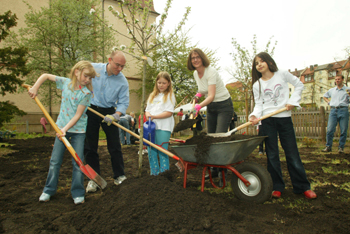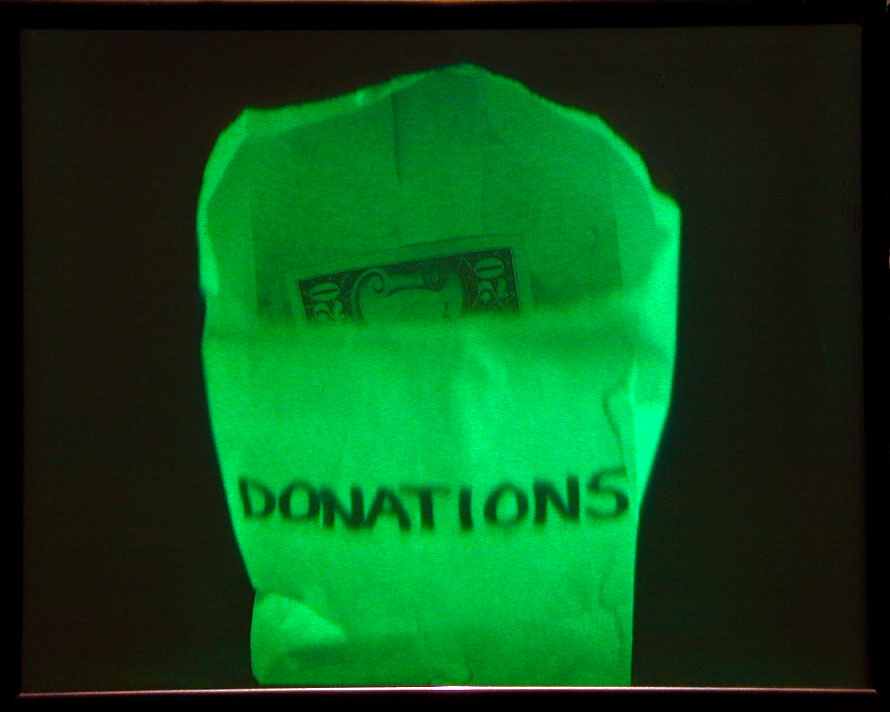Specific Target Groups |
 SMEs key players in human resources, business
development and marketing
SMEs key players in human resources, business
development and marketing
 Social
partners Social
partners
 Local
authorities Local
authorities
 Local
NGOs and initiatives Local
NGOs and initiatives
 Public
decision makers Public
decision makers
|
Specific Trainer's Profile |
Specific
skills and experience recommended for this training module are:
 Networking oriented profile (team orientated, excellent
communication skills)
Networking oriented profile (team orientated, excellent
communication skills)
 Basic
knowledge of the third sector and its legal regulations Basic
knowledge of the third sector and its legal regulations
 Basic
knowledge of public administration on local and national level Basic
knowledge of public administration on local and national level
 General
awareness and specific knowledge on support programmes, funds and other
resources General
awareness and specific knowledge on support programmes, funds and other
resources
|
General Objective |
After
the training module participants will be able to better understand a
company’s impact on society, identify existing community links related
to the specific situation of a SME and develop win-win situations
between companies and the society.
|
|
Specific Objectives
|
After
the training module participants will be able to:
 Better
understand local strategic partnerships of private, public and voluntary
sectors Better
understand local strategic partnerships of private, public and voluntary
sectors
 Identify
individual factors on corporate volunteering for the benefit of the
greater community taking into account the SME’s strategic CSR priorities Identify
individual factors on corporate volunteering for the benefit of the
greater community taking into account the SME’s strategic CSR priorities
 Develop
individual CSR concepts by matching business opportunities with community
involvement Develop
individual CSR concepts by matching business opportunities with community
involvement
 Benchmark
the SME’s individual community involvement with other practical examples Benchmark
the SME’s individual community involvement with other practical examples
|
Theoretical
Contents / Learning Contents |
Theoretical
Contents in the
module “Community” should be introduced and discussed in relation to
Corporate Social Responsibility (CSR) in general, using, as methodological
approach the “CSR Knowledge Map”.
This module is based on
the following theoretical reflections:
The local community, where a SME is based, can include all groups of
stakeholders legitimately interested in financial results as well as
social and environmental impact of the enterprise. In those cases where
SMEs operate locally, their stuff, shareholders, customers, suppliers and
authorities as well as possible peer and pressure groups can be located in
the direct neighbourhood. SMEs are directly affected by the current state
and developments of their local environment, i. e. in terms of efficient
local infrastructure, spending power of customers, attractivity of living
space for employees and their families etc.
Being a responsible company is becoming more and more a question of
survival, combined with the advantages and business opportunities due to
strategic partnerships between the community and corporate sector.
Besides to public recognition and respect for socially responsible
business practice, SMEs and the community can profit both by corporate
volunteering strategies as a pro-active CSR strategy directly related to
the company’s location. Such activities realized as team or individual
opportunities, enable employees to expand their skills in new environments.
The
module “Community” supports SMEs in establishing a constructive
dialogue with all of their stakeholders in order to win through a
sustainable stronger and healthier community.
| Capacity
Building of SMEs |
|
Capacity
Building of SMEs
in order to build the organisation's effectiveness and
sustainability. This process assists an individual or group to
gain the insights, knowledge and experience needed to solve
problems and implement change.
An
instrument of capacity building in the context of community
involvement is Corporate
Volunteering (Employee Community Involvement), where
businesses support and encourage staff involvement in the
community.
|
 |
| Win
Win Situations |
|
Win
Win Situations
by
promoting effective local partnerships between all sectors can be
supported pro-actively by an SME identifying and developing its
existing community links. Relating
to individual CSR strategies, SMEs can realize i.e. concepts of Cause-based
or Community
Investment, Cause-related Marketing and Sponsorship.
A Learning
Community should always be based on transparency and a Stakeholder
Dialogue.
|
 |
| Donations |
|
Donations
as
traditional tools of community involvement can be orientated on
certain issues or dates and strongly as well as sustainable be
supported by a Corporate
Foundation. In order to activate participation of
the SME’s employee, Donation
Employee Matching Gifts can be part of a CSR
strategy.
|
 |
| Comunity
Involvement |
|
Community
Involvement can
be done by a company placing emphasis on certain projects in local
partnership, money donation as such or CSR instruments little
cost-intensive in the field of Corporate Volunteering.
Whatever
community involvements show up as most relevant, the module “Community”
should enable an understanding about many individual ways on which
SMEs
can act more responsible in their community policy.
|
 |
|
Module Structure |
 |
Opening,
getting acquainted
|
 |
Presentation
of the objectives/goals and contents of the training module |
 |
General
information about CSR and positioning the training module into the
broad CSR problematic (“CSR Knowledge Map”) |
 |
Learning
content topics: |
|
 |
Stakeholder
dialogue |
|
|
|
Importance
of pro-active dialogue with stakeholders (peer and pressure groups)
|
|
|
|
Combining
different styles of communication in order to establish supportive
environment for a dialogue
|
|
|
|
Developing
awareness of different backgrounds and interests of stakeholders
involved in a dialogue
|
|
|
|
Risk
management |
|
 |
Community
involvement
|
|
|
|
Overview
of CSR instruments
|
|
|
|
State
of the art on CSR in local communities |
|
|
|
Legal
framework of an application of CSR instruments
|
|
|
|
Chances,
responsibilities and restrictions of SMEs in local communities
|
|
 |
Corporate
volunteering and sponsorship |
|
|
|
Concrete
participation of employees in corporate volunteering programmes
|
|
|
|
Human
resources management |
|
|
|
Strategic
approach of sponsorship (lead sponsorship) and corporate
volunteering in SMEs |
|
|
|
Companies
/ products |
 |
Evaluation
of the training module and offering support for implementation |
|
|
|
|
|
Methods
and Practical Training Activities |
| Definition
of the kind of pedagogical methods to be used |
The
trainer will use the following main pedagogical methods:
 Theoretical
exposition Theoretical
exposition
 Development
and discussion of exercises (individually and in working groups) Development
and discussion of exercises (individually and in working groups)
 Development
of a stakeholder dialogue (role play) Development
of a stakeholder dialogue (role play)
 Development
of a CSR activity in the field of community, based on the individual
character and needs of the respective SME Development
of a CSR activity in the field of community, based on the individual
character and needs of the respective SME
 In
the extended programme, one of the choices given to the trainer is the
possibility of using a “discovery and finding out method”: a visit to
a local SME with good community practices In
the extended programme, one of the choices given to the trainer is the
possibility of using a “discovery and finding out method”: a visit to
a local SME with good community practices
| Definition
of the practical training activities to be developed |
For
the Standard
Programme (4h) it is
recommended to develop the following practical training activities:
 Presentation,
development and discussion of Exercise 6.1. Presentation,
development and discussion of Exercise 6.1.
 Presentation,
development and discussion of Exercise 6.2. (using the Ethical Dilemma nº
3) Presentation,
development and discussion of Exercise 6.2. (using the Ethical Dilemma nº
3)
 Presentation,
development and discussion of Exercise 6.3. Presentation,
development and discussion of Exercise 6.3.
For the Extended
Programme (4h-8h) it is recommended the Standard
Programme + one or more
of the following activities:
 Presentation,
development and discussion of Case Study nº 3, nº 4, nº 11 or nº 12 Presentation,
development and discussion of Case Study nº 3, nº 4, nº 11 or nº 12
 Study
visit to a local SME with good community practices Study
visit to a local SME with good community practices
|
Didactical/Pedagogical Resources/Material |
 Flipcharts Flipcharts
 Video
projector Video
projector
 Computer Computer
 CSR
Knowledge Map CSR
Knowledge Map
 Exercises
6.1., 6.2. and 6.3. Exercises
6.1., 6.2. and 6.3.
 Ethical
Dilemma nº 3 Ethical
Dilemma nº 3
 Case
Study nº 3, nº 4, nº 11 or nº 12 (extended programme) Case
Study nº 3, nº 4, nº 11 or nº 12 (extended programme)
 “How
to Organise a Study Visit to a Socially Responsible Company –
Practical Guide”, developed
within the framework of the Leonardo da Vinci Pilot Project “CSR/SME -
Promoting Social Responsibility in Small and Medium Size Enterprises”
(extended programme) “How
to Organise a Study Visit to a Socially Responsible Company –
Practical Guide”, developed
within the framework of the Leonardo da Vinci Pilot Project “CSR/SME -
Promoting Social Responsibility in Small and Medium Size Enterprises”
(extended programme)
 Participant’s
Feedback Questionnaire Participant’s
Feedback Questionnaire
Further
Study Material to be given to the participants
 Corporate Social
Responsibility: State of the Art, 2004 (developed within the framework of
the Leonardo da Vinci Pilot Project “CSR/SME - Promoting Social
Responsibility in Small and Medium Size Enterprises” and available in
the six countries involved: AT, EE, HU, IT, NL, PT)
Corporate Social
Responsibility: State of the Art, 2004 (developed within the framework of
the Leonardo da Vinci Pilot Project “CSR/SME - Promoting Social
Responsibility in Small and Medium Size Enterprises” and available in
the six countries involved: AT, EE, HU, IT, NL, PT)
 CSR
Glossary, 2005 (developed within the framework of the Leonardo da Vinci
Pilot Project “CSR/SME - Promoting Social Responsibility in Small and
Medium Size Enterprises”). Subjects: Community Involvement CSR
Glossary, 2005 (developed within the framework of the Leonardo da Vinci
Pilot Project “CSR/SME - Promoting Social Responsibility in Small and
Medium Size Enterprises”). Subjects: Community Involvement
|
Duration |
|
Module
Structure
|
Duration
|
Accumulated
Time
|
Notes
|
|
Beginning
|
End
|
|
Opening,
getting acquainted
General
information about CSR and positioning the module into the broad CSR
problematic
|
15
m.
|
0:00
|
0:15
|
Adaptable
according to the group circumstances, namely: participants profile,
integrated or stand alone module, existence of newcomers, etc.
|
|
Presentation
of the objectives/goals and contents of the module
|
05
m.
|
0:15
|
0:20
|
|
|
General
information about CSR and positioning the training module into the
broad CSR problematic
|
05
m
|
0:20
|
0:25
|
Using
the “CSR Knowledge Map”.
|
|
Theoretical
introduction to the training module
|
15
m.
|
0:25
|
0:40
|
|
|
Exercise
6.1. - “Story Telling about CSR” – Preparations / single work
|
20
m.
|
0:40
|
1:00
|
|
|
-
Presentations of each participant and contributions of the group
|
45
m.
|
1:00
|
1:45
|
Time
is varying according to the number of participants: approximately 5
minutes per participant, including max. 3 minutes for presenting the
story.
|
|
|
|
|
|
|
|
BREAK
|
15
m.
|
1:45
|
2:00
|
|
|
|
|
|
|
|
|
Exercise
6.2. - “Role-Playing in a Stakeholder Dialogue”
-
1st brainstorming session with the whole group
|
10
m.
|
2:00
|
2:10
|
|
|
-
Role play in two groups
|
20
m.
|
2:10
|
2:30
|
|
|
-
2nd brainstorming session with separated groups
|
10
m.
|
2:30
|
2:40
|
|
|
-
3rd brainstorming session with the whole group brought
together again
|
10
m.
|
2:40
|
2:50
|
|
|
|
|
|
|
|
|
BREAK
|
10
m.
|
2:50
|
3:00
|
|
|
|
|
|
|
|
|
Exercise
6.3 - “Team Building Day”
-
Preparation of ideas / single work
|
10
m.
|
3.00
|
3.10
|
|
|
-
Presentations
|
30
m.
|
3.10
|
3.40
|
Time
is varying according to the number of participants: approximately 3
minutes per participant.
|
|
Conclusions
|
5
m.
|
3.40
|
3.45
|
|
|
Evaluation
|
15
m.
|
3:45
|
4:00
|
Using
the “Participant’s Feedback Questionnaire” or any other tool
already in use in the VET organisation.
|
|
END
|
|
|
|
|
| Extended
timetable (4h – 8h) |
If
you are planning to have a “Community” training module longer than
four hours, we suggest you to add to the standard timetable one or more of
the following extra activities:
|
Extra
Activities
|
Duration
|
Notes
|
|
Case
Study nº 3, nº 4, nº 11 or nº 12 + debate
|
30
m.
|
Make
sure you don’t use a case study already presented to the
participants in a previous training module.
|
|
Study
visit to a local SME with good community practices
|
2h
to 3h
|
Preferably
used as a stand alone extra activity.
The
visit duration should be adjusted according to participants and
company profile, distance and time available.
|
|





